One of the finest college players in the country while at Duke University and a member of the 1964 US Men’s Olympic basketball team, the 6’4″ Jeff Mullins was understandbly in high demand for the 1964 NBA draft.
Ed. Note: Eww, said something positive about a Blue Devil
The St. Louis Hawks drafted Mullins fifth overall. However, that lofty draft position belied the Hawks’ ultimate utilization of Mullins. The team was bursting with veterans and player-coach Richie Guerin elected to let Jeff ride the pine.
1964-65 season: 4.9 PPG in 44 games.
1965-66 season: 5.8 PPG in 44 games.
Again, in Guerin’s defense, the team was stacked, but this was wasting Mullins’s talent. Lucky for Mullins, the expansion Chicago Bulls drafted him in the spring of 1966 from St. Louis’s pool of unprotected players. Mullins didn’t know it yet, but this set in motion his path to stardom.
In fact, Mullins seemed somewhat moody about the whole thing according to the St. Louis Post-Dispatch from May 10, 1966:
“I haven’t decided whether I will report or not [to Chicago],” Mullins said. “I will have to start thinking about my future and this will include other fields. I think that team will give a fine opportunity to anyone interested, but at present, I’m not sure I’m interested. Right now I am going to analyze any opportunity that presents itself. It will be just like when you get out of college; you go through a series of interviews to see what’s what.”
Mullins finally signed a deal with the Bulls in August 1966, but the next month he was traded to the San Francisco Warriors in exchange for veteran guard Guy Rodgers. Rodgers wound up playing just one year in Chicago, but he was an All-Star, so it’s defensible for the Bulls. It’s the Hawks who would really come to rue their handling of Mullins.
Arriving in San Francisco, Mullins was finally given a legitimate opportunity to showcase his skills, albeit as a sixth man, since the Warriors were also laden with talent.
San Francisco boasted Nate Thurmond, Rick Barry, Tom Meschery, Al Attles, and Jim King along with Bill Sharman assuming his first season as coach in the NBA. A longtime All-Star player with the Celtics, Sharman relished a fast-paced team predicated on wiping the boards clean and instantly chugging the other way up court for easy baskets. Thurmond handled the rebounds (21 per game) as seven Warriors finished the season averaging double-figures in scoring, including Rick Barry’s astounding 35.6 PPG.
Mullins, as the first man off the bench, averaged about 13 points and five rebounds per game in his first season with the Warriors. Quoted in the February 1, 1967, Reading Eagle Mullins was obviously thrilled with the change of scenery and bigger role:
“St. Louis was more a pattern ball club and I can’t handle the ball that well. I’m better on a fast break where I can gamble more and don’t have the smaller guards hounding me.
“I told Mr. Kerner, owner Ben Kerner of the Hawks, I was going to quit if I had to stay with St. Louis….
“[The Warriors’] style was more suited to me,” Mullins said. “Coach Bill Sharman taught me to move without the ball to get open for shots. I’m not required to be an all-around guard. I’ve gotten to the point where I like to come off the bench. I go in now with a purpose and know what I’m doing. I’m supposed to give the club a lift, heat things up.”
Jeff was right about heating things up.
In the opening round of the playoffs, the Warriors swept the Los Angeles Lakers with Mullins averaging a respectable 13.7 PPG and 8.3 RPG. Then they defeated the St. Louis Hawks in a six-game throwdown in the Western Division Finals that saw Mullins play a pivotal role in thwarting his old team.
The decisive Game 6 in St. Louis was marred by some egg throwing fans, but Rick Barry went off for 41 points and Mullins sank a clutch shot to tie the game at 98-98 and then hit all six of his free throws down the stretch to help secure a 112-107 win.
For the series, Mullins whooped the Hawks’ collective ass averaging 23.3 PPG, 6.0 RPG, 4.5 APG, .500 FG%, and .848 FT%. I think Mullins may have entered that series with a bit of retribution on his mind.
Although the Warriors would lose to the juggernaut 68-win Sixers in the NBA Finals, the future certainly looked bright. The nucleus of Thurmond (25), Barry (22) and Mullins (24) were all under 25 years of age. That should have been good for at least five seasons of a title contender barring any catastrophe…
Well, there would be catastrophe and the Warriors didn’t make it back to the NBA Finals until 1975.
Rick Barry, in one of the worst career moves in sports history, bolted for the newly-formed ABA in the summer of 1967. A byzantine legal battle too long to detail here erupted between the two leagues and Barry. The bottom line: Barry was gone and his departure opened up a revolving door of attempted third wheels to pair with Mullins and Thurmond. And these were all good players, but they were either just past their prime (Rudy LaRusso, Jerry Lucas) or in their prime but just not as good as Barry (Cazzie Russell).
Individually, though, Mullins blossomed in Barry’s absence becoming the team’s go-to scorer. For the next seven seasons (1968-1974), Mullins would average at least 16 PPG, including a four-year streak of 20+ PPG. Mullins got to these averages with a dazzling array of quirky off-balance and lean-in shots that made use of his quick movement on offense and a soft touch on his release.
His play-making even improved as he became more of an all-around player. During this same seven-season stretch, Mullins averaged at least four assists per game, peaking at 5.9 APG in 1972.
During the Barry interregnum (1968-1972), the Warriors made the playoffs all but one of the five seasons, but were always eventually bounced by either the Los Angeles Lakers of Jerry West, Wilt Chamberlain, and Elgin Baylor or by the Milwaukee Bucks of Kareem Abdul-Jabbar, Oscar Robertson, and Bobby Dandridge.
Mullins’s best postseason came in 1968 when he averaged 25.1 points on a blistering 52% shooting to go with 4.4 rebounds and 4.9 assists per game. And once more, he annihilated his erstwhile team, the Hawks. This time it was even worse than the 1967 drubbing.
The story in the Windsor Star continued…
Mullins scored 35 points Friday night including a banked jump shot with six seconds left to give San Francisco a 3-1 lead in the best-of-seven series with the Hawks on a 108-107 triumph. It’s an incredible margin since St. Louis won seven of eight games from the Warriors during the regular season while winning the Western Division title.
Mullins… has now scored 130 points in the four playoff games against his former teammates for an average of 32.5 points a game.
Mullins had his only dud game of the series (12 points) as the Hawks beat San Francisco in Game 5. But Pork Chop, as he was known, finished off St. Louis in Game 6 going for 20 points on 10-16 shooting.
Naturally, in the next round, the Warriors lost to the Lakers. LA got a four-game sweep, but aside from a Game 1 blowout it was close. The Warriors lost Games 2, 3, and 4 by a combined 13 points.
Oh well, there’s always next year!
And Mullins came out hot versus LA in the 1969 playoffs with 36 points and seven assists in a Game 1 win. In Game 2 he cooled off to just 20 points on 9-24 shooting, but the Warriors got another W. Then in Game 3, he hurt his knee in a collision early in the contest.
“I couldn’t do anything on the knee,” Mullins lamented after the game. “It just swelled up on me. Everything will depend, I guess, on how well the knee responds to treatment in the next 48 hours.”
Uh, it didn’t respond. He hobbled his way to seven points in Game 3, before getting pulled in the blowout loss. In Games 4 and 5, he scored just two points total on 1-10 shooting 🤮
Jeff got his groove back in Game 6, but it didn’t matter. His 21 points, five assists, and five rebounds were but saliva spat into the ocean as the Lakers eliminated San Francisco in a 40-point blowout.
The Warriors missed the playoffs entirely in 1970 as Thurmond was out half the year with injury. They got back in for 1971, but got smacked down by the 66-win Bucks. In 1972 it was the same old story, but this time the Bucks “only” had 63 wins.
This period was when Mullins had reached the peak of his individual stardom, just as the club was at its low ebb. He made the All-Star Team in 1969, 1970, and 1971.
Finally in 1973, Barry exited the ABA and rejoined the Warriors. The club finally won a series since Mullins’s demolition derby of the Hawks in ’68 by upsetting the dreaded Bucks in six games. Of course, the Lakers waited for them in the next round. San Francisco lost in five games.
A cruel, cruel world.
Despite a 44-38 record in 1974, the Warriors did not qualify for the playoffs out West. A shame since this was Mullins’s last season as a major contributor averaging 16.2 PPG, 4.0 APG, and a career-high .875 FT%.
Well, the Warriors came back strong in 1975. Their 48-win campaign in a relatively balanced Western Conference gave them the #1 seed.
Shaking things up, they had also traded stalwart Nate Thurmond to the Chicago Bulls for the young and long-armed Clifford Ray. Additionally, the Warriors drafted Jamaal Wilkes and had a deep roster of good players like Charles Johnson, Phil Smith, and Butch Beard.
With Barry still having superstar talent (30.6 PPG, 6.2 APG, 5.7 RPG, 2.8 SPG), it was 32-year-old Mullins who ceded playing time to the younger cats. Coming off the bench for the first time since 1967, Mullins averaged 8.2 PPG in 17.3 minutes a night.
Outlasting the Bulls in a ferocious seven-game conference finals, the Warriors then swept the Washington Bullets in the Finals to finally capture the NBA title.
Pork Chop didn’t set the world on fire, but he was solid at his old age. In Game 7 versus Chicago, he mustered eight points, three rebounds, and three assists in 19 minutes as Golden State won 83-79.
In the NBA Finals, Mullins averaged 8.0 PPG and 3.3 RPG on .552 FG%. The series was a sweep, but two of the victories came by a single point each, so the Warriors needed every ounce of productivity from ole Jeff.
Mullins had come full circle to finally get his championship and was darn lucky to barely cross this finish line. The Raleigh News and Observer had a great story by A.J. Carr on Mullins’s ailing body, but also rejuvenated spirit, during the stretch run of the ‘75 season.
If Jeff Mullins walked through a field of four-leaf clovers, he’d probably come out with poison ivy.
If he found a lucky penny, it would probably turn out to be a bogus coin.
It has been that kind of year for the Golden State veteran—unlucky. Once an “Iron Man,” Mullins missed most of the long, pivotal pre-season with a lung ailment, then sat out a month of the regular campaign with a fractured hand and broken heart.
But as the NBA championship series near, the 33-year old Warrior is healthy and exuding the same boyish enthusiasm he did 11 seasons ago. He has long been a money player—one who produced in the playoffs—and this might be his last big payday.
“My statistics are not up to what they’ve been the last eight years,” Jeff philosophized. “But I like to think I can contribute in terms of leadership to this team, too. We have a lot of young players, so I try to pass on some knowledge to them.”
After one more season as a reserve in 1975-76, Mullins hung it up from the NBA. In typical fashion, the Warriors actually had the NBA’s best record in ‘76 (59 wins), but lost in the Western Conference Finals to Phoenix.
At least it wasn’t Milwaukee or LA.
Anyhoo, Mullins’s career is a quirky mix of good fortune and bad breaks.
It’s quite evident that he flourished playing alongside Rick Barry and one can only wonder how much resonance the careers of Thurmond, Barry, and Mullins lost due to the ABA adventures of the Rickster. They easily could have challenged the preeminent West powers, Milwaukee and Los Angeles. Thurmond could have handled Wilt and Kareem, while Barry and Mullins would match up with West-Baylor (and later Goodrich) and Oscar-Dandridge.
But that’s wishful, hypothetical thinking.
The reality is that Mullins was lucky to “toil” in San Francisco after being mothballed for two years in St. Louis. And in the end, he still strung together three straight All-Star appearances and contributed to a championship team. Frankly, I find it embarrassing Golden State never retired his number. He ranks third in franchise history for games played, sixth in minutes and assists, and seventh in points.
His career may not have attained all its possible highs, but in the end you can’t complain with how it turned out.
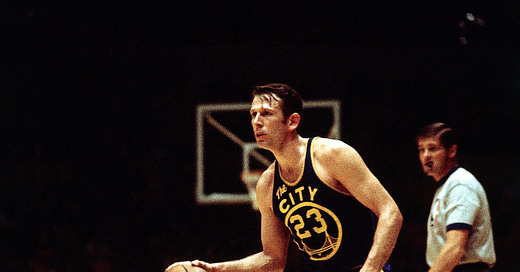


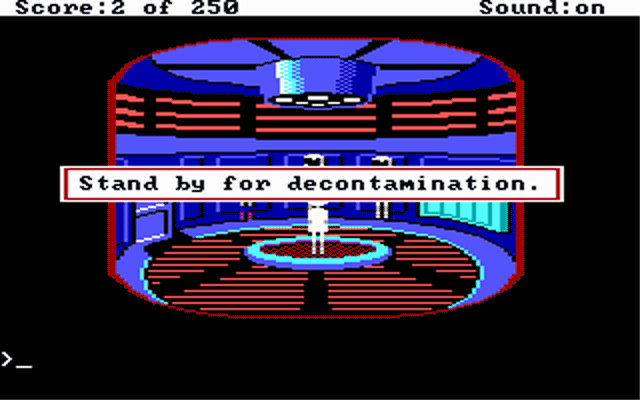
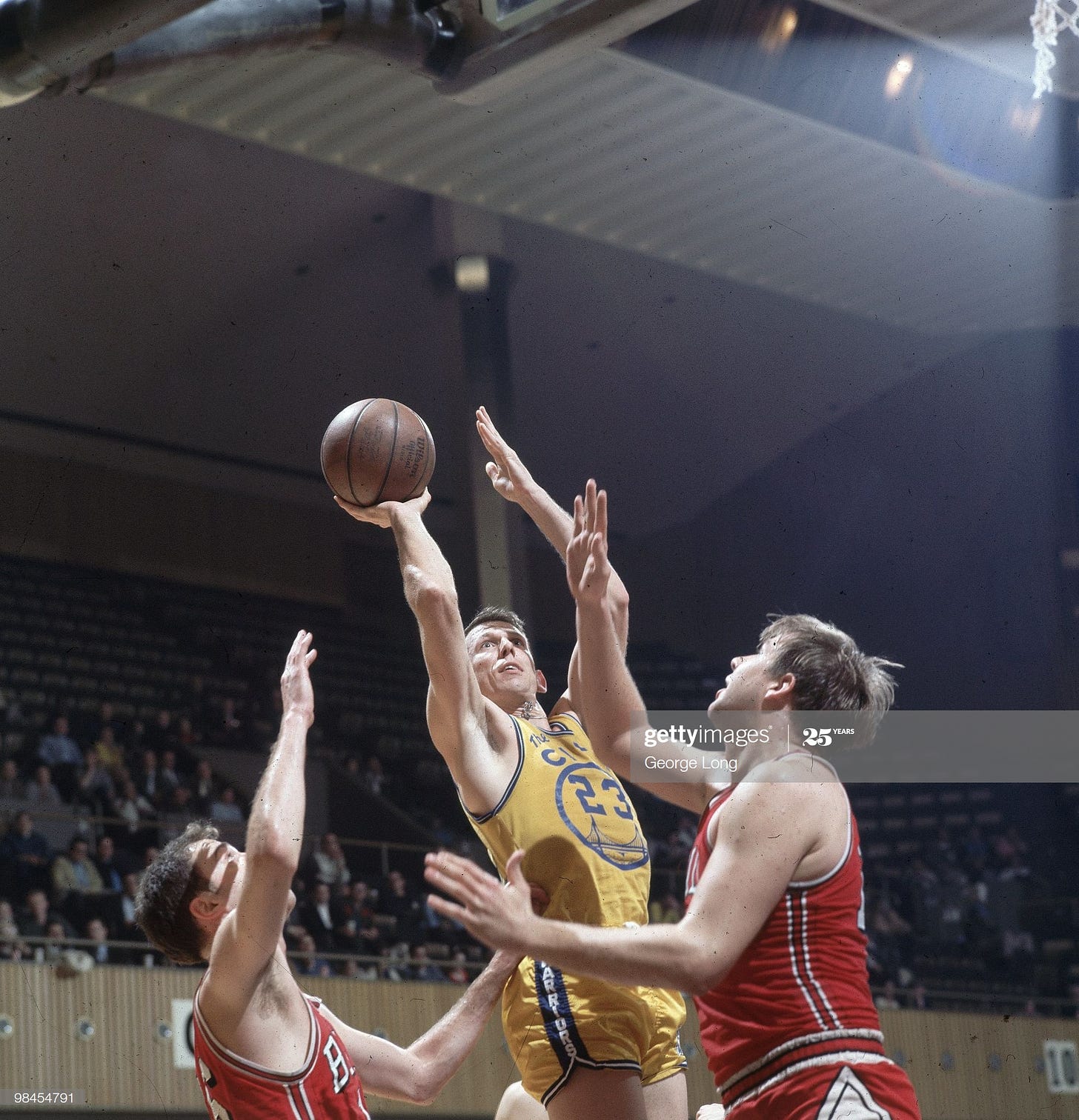

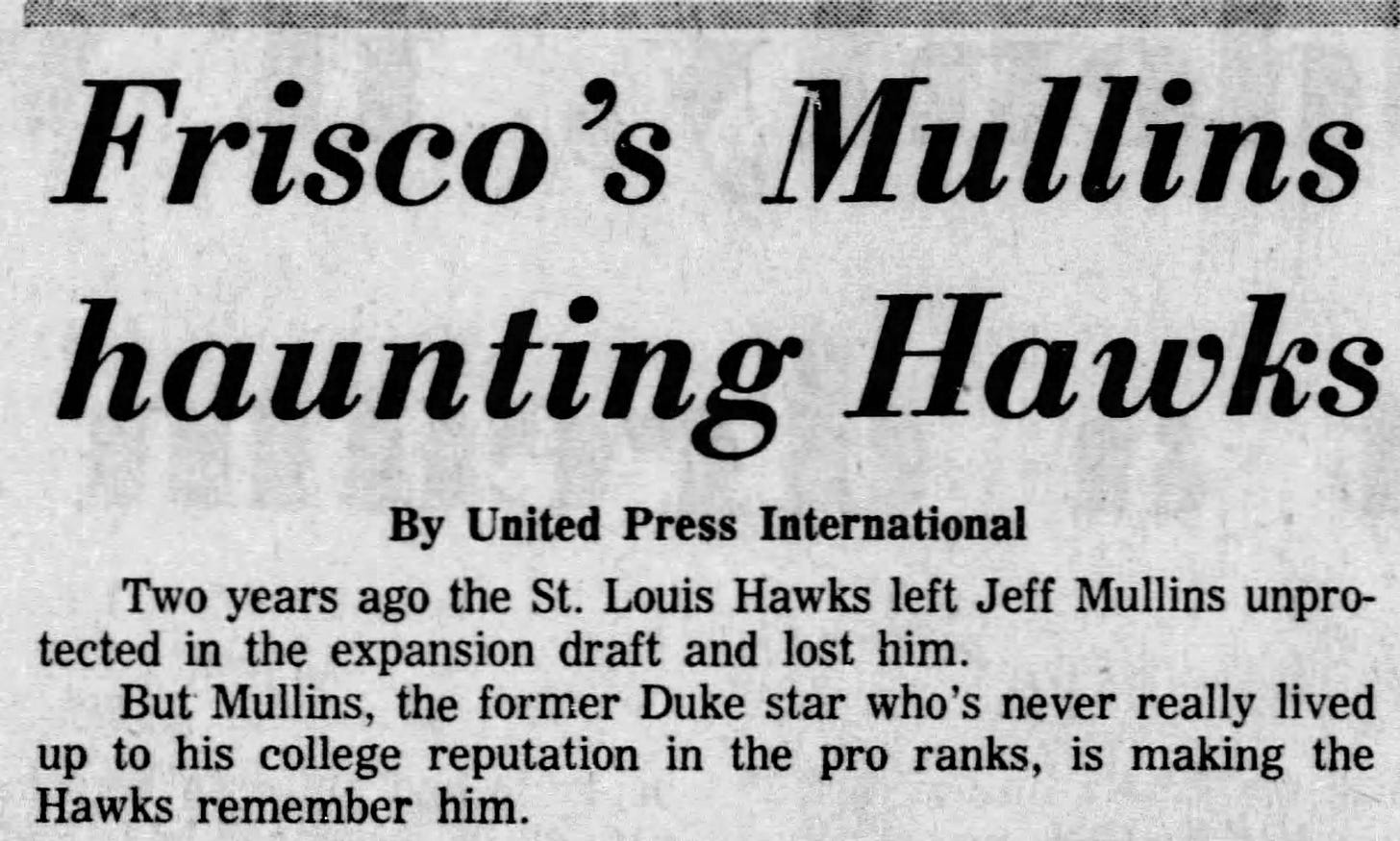
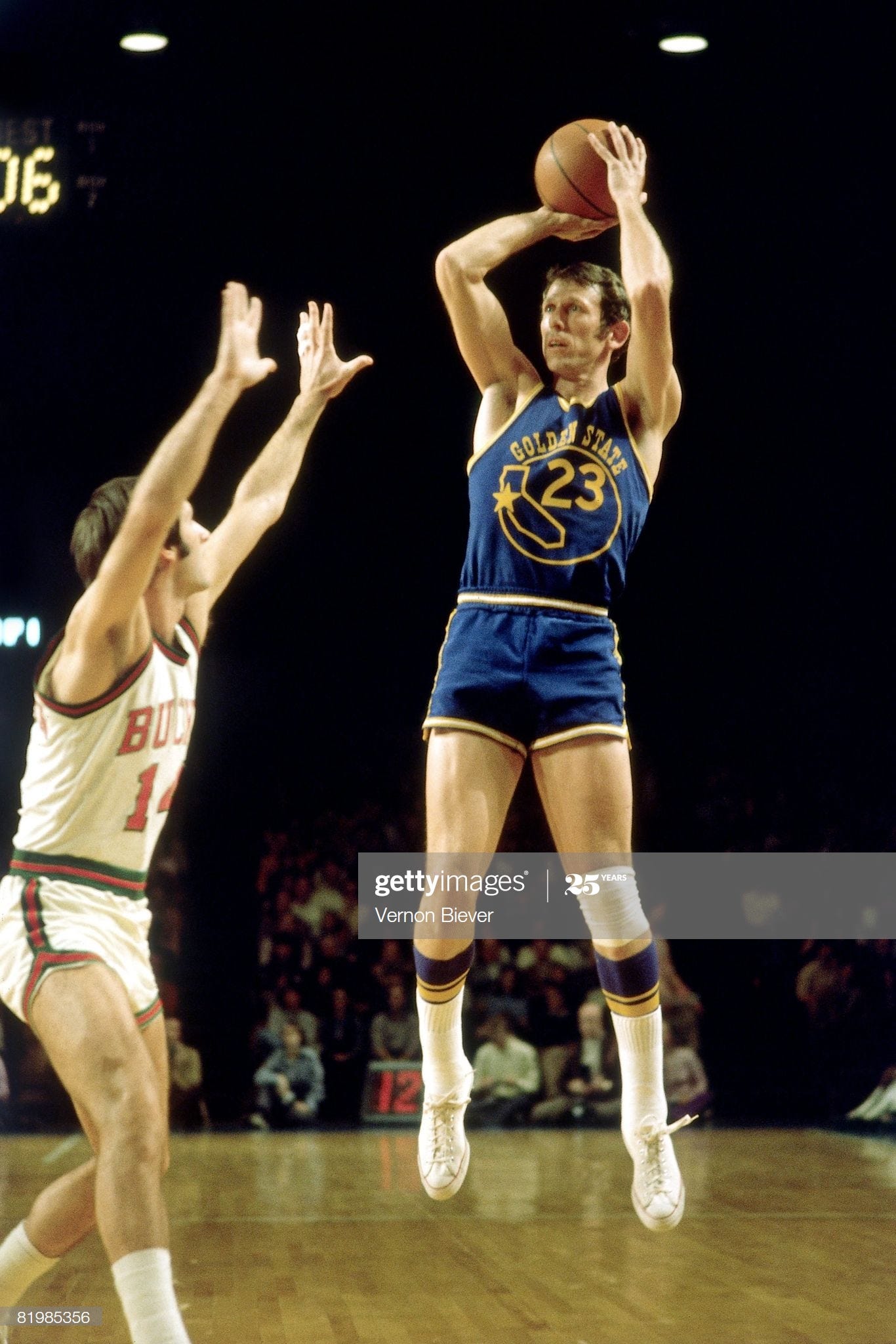
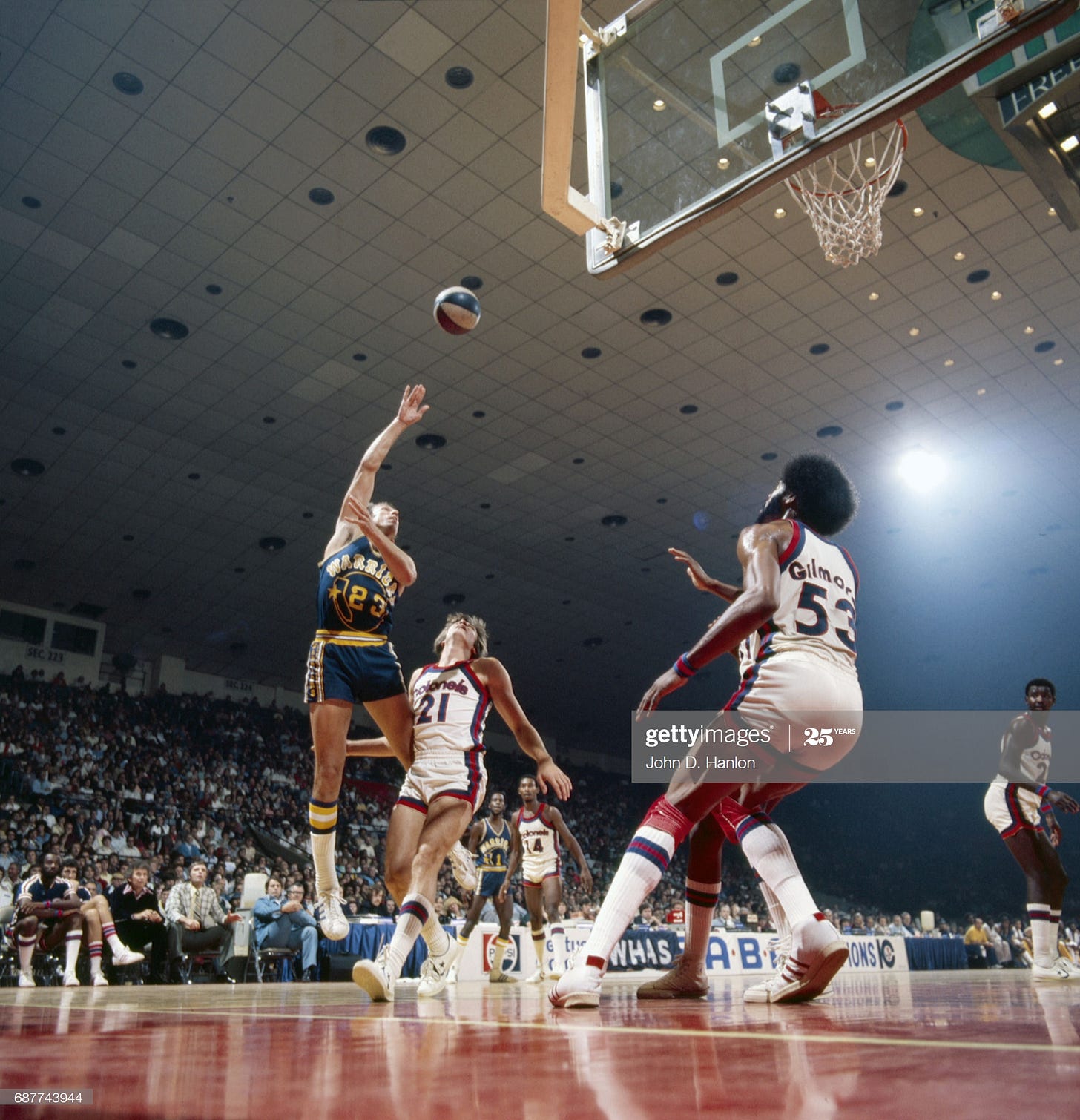
Why did the Warriors retire Tom Meschery's number but not Mullins'?